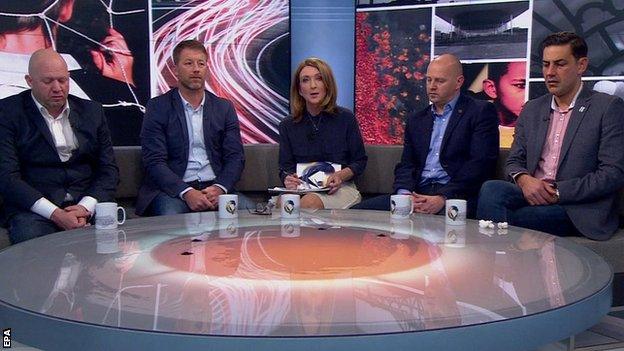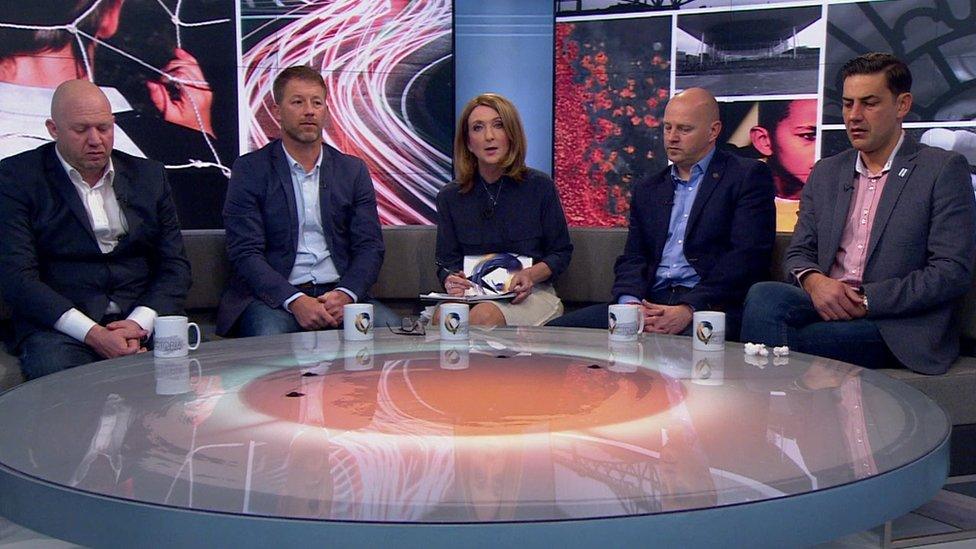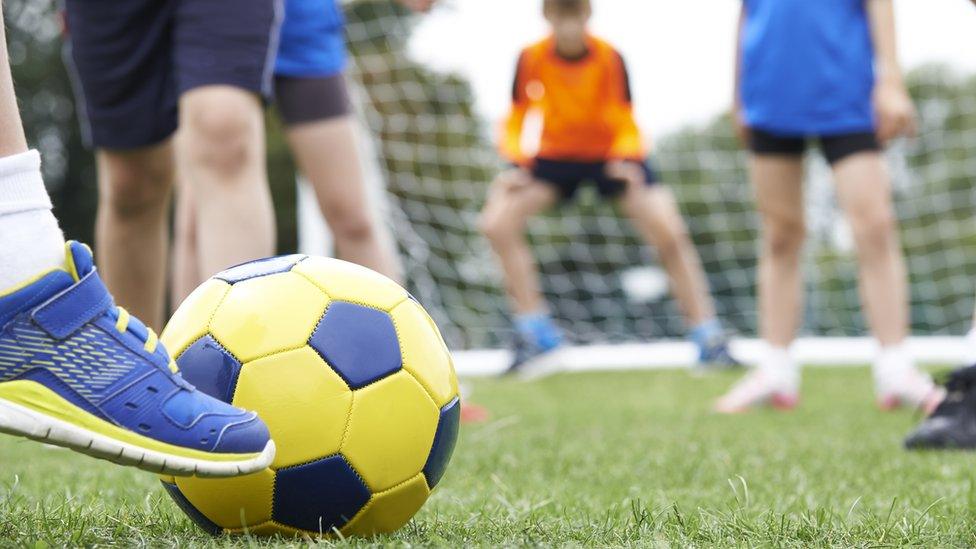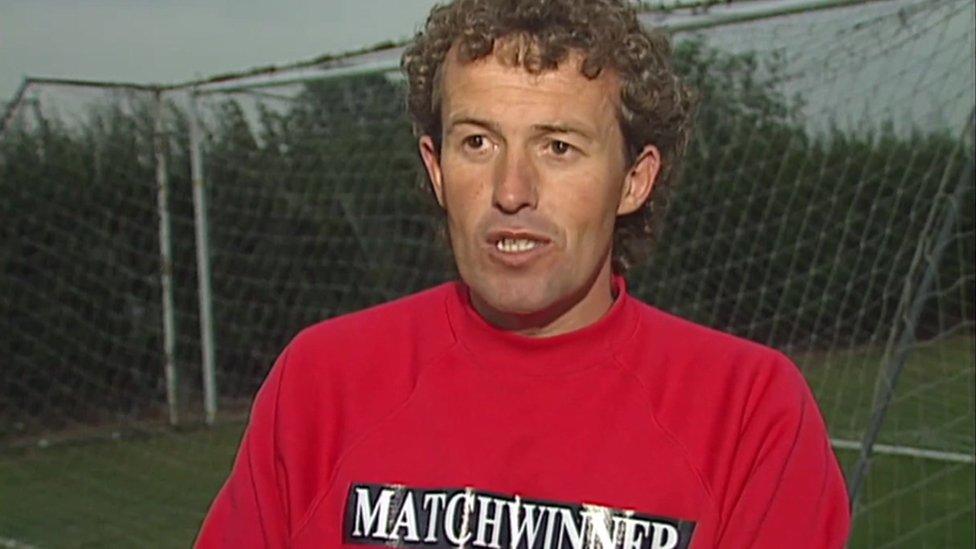Sex abuse: Football Association to investigate allegations
- Published
Andy Woodward speaks about being sexually abused by his coach
The Football Association has confirmed it is investigating allegations of sexual abuse in football.
Former footballers have come forward to say they were sexually abused as youth players.
Four police forces are investigating the allegations, and an NSPCC hotline has had more than 100 calls.
The FA said it was working closely with police, adding it "must ensure we do not do anything to interfere with or jeopardise the criminal process".
The FA has instructed independent leading counsel Kate Gallafent QC, an expert in child protection, to assist with its review.
The internal review will look at what information the FA was aware of at relevant times, which clubs were aware and what action was, or should have been, taken.
The Child Protection in Sport Unit, which has assisted the FA in relation to its safeguarding procedures since 2000, will also carry out an independent audit into the FA's practices.
The NSPCC hotline was set up after David White, Andy Woodward, Steve Walters and Paul Stewart all spoke out about abuse.
Ex-Crewe player Woodward, 43, went public on 16 November about his abuse by former Crewe coach and youth football scout Barry Bennell, who was later convicted of sex offences against children. Crewe have begun their own independent review into the allegations.
Former youth team players Chris Unsworth and Jason Dunford also told BBC's Victoria Derbyshire programme they had been abused by Bennell.
The players all waived their right to anonymity to speak publicly.

Ex-players Jason Dunford, Steve Walters, Chris Unsworth and Andy Woodward have spoken to the BBC
'Six or seven clubs connected'
Professional Footballers' Association (PFA) chief executive Gordon Taylor says more than 20 former footballers have come forward regarding allegations of sexual abuse.
Taylor said at least "six or seven clubs" including Crewe, Manchester City, Blackpool, Leeds, Stoke and Newcastle were connected with "particular individuals".
Blackpool released a statement saying the club "is yet to receive any information from the PFA or relevant authorities in relation to the ongoing investigations of historical abuse".
Leeds also said it had not been made aware of any allegations but would "take any such complaints seriously and will cooperate fully with the PFA and the FA with any investigations".
Taylor added: "Should any past links with the organisation come to light, the club will provide every assistance it possibly can."
"I am expecting there will be more," he told BBC Radio 5 live's Sportsweek, adding he did not believe it would just be confined to north east and north west of England clubs.
"I am mindful it could be throughout the country where children are there; church, schools and other areas we are well acquainted with over the past few years."
However, Taylor, 71, said none of those who had come forward were currently playing in the top four leagues in England.
He said the alleged abuse occurred to footballers aged six to 16, when players were "vulnerable young people".
"It is the situation they are put in, the fear of telling anyone, the power of the paedophile over him and what he wanted to do for himself and his parents to achieve his dream of being a professional footballer," said Taylor.
'There were no limits to what he put people through'
Former trainee footballer Ian Ackley, who appeared as a witness in Barry Bennell's child abuse trial in 1998, at which he was convicted, told BBC Radio 5 live's Sportsweek he first met Bennell when he was 10 years old and he was abused for three an a half to four years.
I was playing for a local side and he was scouting. He asked me to go along for a trial with his team.
The draw to him was his connections with big teams. He was a good coach, very demanding. He wanted you to commit to a process and if you did then those opportunities might come your way.
He created the image of a charismatic figure in the football world who could make a young boy's dreams come true.
The abuse happened after an initial period of a week or two, just after I had signed. It was the full range of abuse. There were no limits to what he put people through to get what he wanted.
I didn't tell anyone. It was a feeling of being frozen, isolated and not knowing what to do. Who would believe me? I was a young boy still in a time when you were brought up in an environment where children were seen and not heard and to have respect for their elders.
This guy was seen as a very significant person of influence and people in that circle respected him. I knew it was wrong and while the abuse happened it switched a part of me off just to get through it.
Once it finished it was a case of pretending it did not happen. It was almost like a double life. I was trapped in that dream of wanting to make it as a footballer. It was habitual - every weekend, school holiday, football trips.
'Victims must come forward'
Karen Bradley, the Secretary of State for Culture, Media and Sport, has said victims of sexual abuse in football "must come forward".
"Come and give your story, you will be listened to, you will be believed," she told Pienaar's Politics on BBC Radio 5 live.
"The only way that we can find out what happened is by getting the evidence, letting the police do investigations as appropriate and making sure we understand what went wrong"
Bradley has welcomed the FA's inquiry.
She added: "We do need to look at this independently, we do need to make sure the FA and others who I know take this seriously, get to the bottom of this."
The NSPCC has set up a helpline for people affected by sexual abuse at football clubs, supported by the FA. It is available 24 hours a day on 0800 023 2642.
- Attribution
- Published27 November 2016

- Attribution
- Published26 November 2016

- Attribution
- Published26 November 2016
